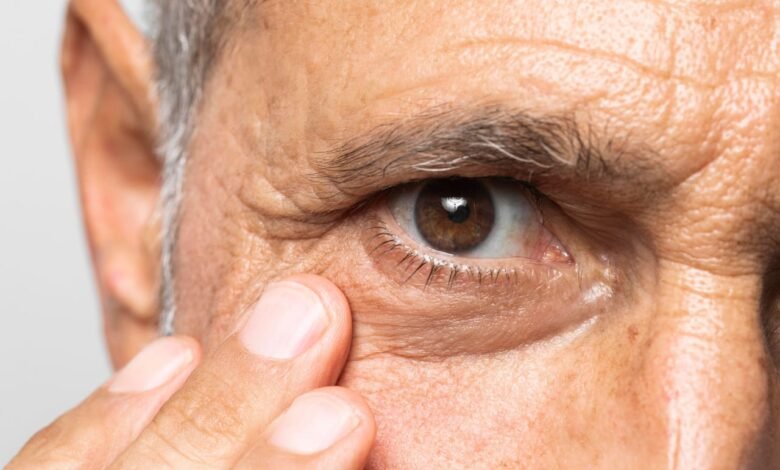What Is The Difference Between Glaucoma And Cataract?

Both glaucoma and cataracts are eye disorders that impair vision and affect your eye health. These conditions may exhibit similar symptoms, but the causes, treatment, and outcomes differ completely. Further, let’s dive into this blog to know the difference between glaucoma and cataracts, their causes, symptoms, and treatments.
What’s glaucoma?
Excess fluids present in your eyes may cause glaucoma, this fluid is called aqueous humor. Daily your body will refresh that fluid, this fluid leaves your eyes through a mesh work drainage field. This old fluid will be replaced with the new fluid just to maintain a steady pressure gradient inside the eyeball.
You will experience some level of pressure inside your eyes when there are blockages in either of the drainage mechanisms. If this pressure persists, fibers in your optic nerves will be damaged and, leading to vision loss. Open-angle and closed-angle are the two types of glaucoma. Most glaucoma cases are closed-angle, in this condition slowly the pressure will build and lead to vision loss. Simply, glaucoma treatment in Coimbatore is very affordable and gives better outcomes.
What are the symptoms of glaucoma?
In the initial stages of glaucoma, you will not notice any symptoms due to its slow formation. Further, the first symptom you may notice is loss of your peripheral vision. In this condition, you may not clearly see things around the outside of your field of vision. In closed-angle glaucoma, symptoms will be abrupt and cause intense eye pain. Your eye may feel firm to the touch and look red. Further, you will feel nauseated.
In closed-angle glaucoma, your vision will become a blur, and you can see light glow around everything. Whenever you notice the signs of glaucoma of closed-angle glaucoma, get medical care as soon as possible. Mostly, elderly people are more prone to this condition.
How to diagnose and treat glaucoma?
One can diagnose glaucoma through routine eye examinations. Firstly, your healthcare provider will give you eye drops that dilate your pupil to diagnose glaucoma. Further, a doctor will also check the pressure in your eyes. Notably, this is a painless procedure. If required, doctors will suggest for eye scan to precisely diagnose the indicators of glaucoma.
Simply, the primary treatment for glaucoma is medicated eye drops, which greatly assist in alleviating the pressure in your eyes. If these eye drops are not helping you, healthcare professionals will perform laser surgery to help your eye fluid drain properly.
During the surgery or microsurgical techniques, small openings will be made to drain that fluid. Further, tiny tubes or stents may be inserted into your eyes to make it possible for fluid to flow out. During the procedure, you will be awakened but sedated and numbed to maintain yourself calm.
What are cataracts?
Inside your eyes, there will be a lens that allows the lights to enter, enabling images to be projected onto your retina at the back of your eye. After some time, the proteins present inside your eye may break down. They can join together, forming yellowish, white, or brown clumps that block your vision. We call this clumps as cataracts. Globally, cataracts remain one of the major causes of vision loss.
What are the symptoms of cataracts?
Usually, cataracts will take some time to develop. First, when they form, you may not notice any symptoms, but over time you will experience symptoms like:
- Blurred vision
- Double vision
- Poor vision at night
- More sensitive to lights
- Often changes to your eyewear prescription
Simply, the cataract symptoms you experience are completely based on the location of the cataract present in your lens.
How to diagnose and treat cataracts?
You can easily diagnose cataracts with a dilation test during a routine eye exam. Your healthcare provider will put a few drops into your eyes to temporarily open your pupils. This helps your doctor to find the presence of any cataracts in your lens.
When your cataract is small, you may be able to change your prescription to treat it with changes to your vision. Doctors will recommend surgery when your cataract is in an advanced stage. Cataract surgery is one of the common procedures, that actually gives you good results.
What is the difference between glaucoma and cataracts?
The main difference between these two conditions is they both have different causes.
- Glaucoma will be caused when the fluids build up in your eyes.
- Cataracts will be caused when those broken proteins accumulate in your eyes.
Further, both glaucoma and cataracts give different outcomes. Simply, in cataracts, with the help of surgery, you can restore your vision, but if you lose your sight due to glaucoma it’s really hard to restore it.
Are they connected in any way?
You have both glaucoma and cataracts at the same time, even one condition may lead to the other. At times, cataracts become huge and block your eye’s natural drainage system. Simply, through surgery, doctors will help you remove the cataract, reopen the blocked drain, and alleviate pressure on the optic nerve.
There are more chances of developing cataracts post-glaucoma surgery. Even, a few studies suggest that you need to wait at least for a year to do cataract surgery after glaucoma surgery. This break is just to ensure that your eyes are stable and healthy to perform the next surgery.
When to consult with a doctor?
At least once a year, consider visiting the best eye doctor in Coimbatore to find out if there are any signs of the presence of glaucoma or cataracts. Simply, whenever you start noticing changes in your vision, immediately visit an eye doctor.
Also, you need to remember that sudden development of glaucoma can lead to serious eye-related problems. Acute eye pain, vomiting, eye redness, and blurry vision are some serious eye-related symptoms you need to get timely medical attention.
Conclusion:
With timely diagnosis and treatment, you can protect your eyes from glaucoma and cataracts. Both glaucoma and cataracts can cause blurry vision and more symptoms. It’s crucial to have frequent eye exams just to ensure that glaucoma or cataracts are detected. Notably, when getting older, you need to stay conscious and need to do frequent checkups.





